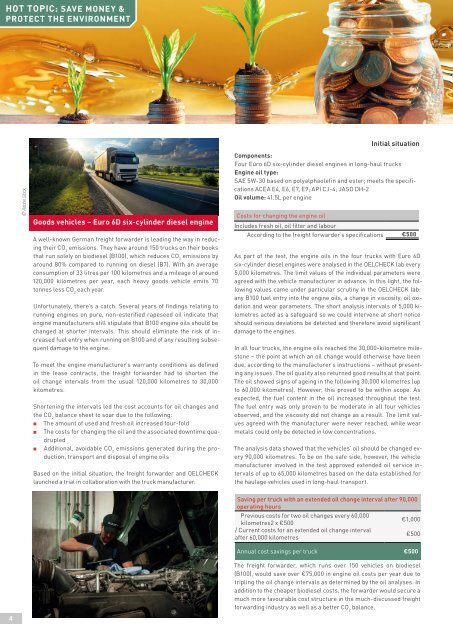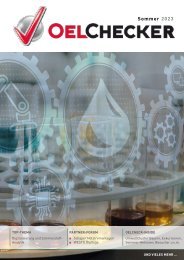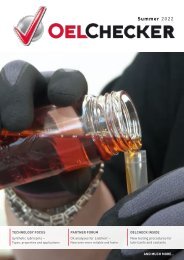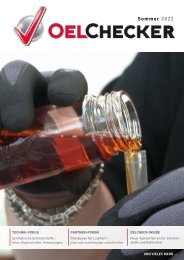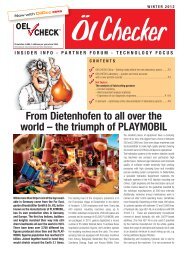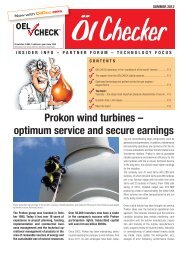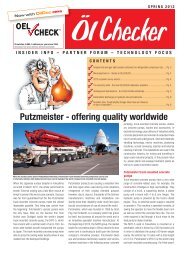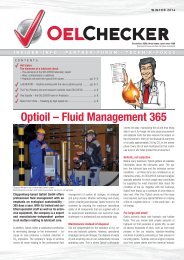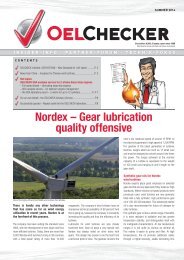OELCHECKER Winter 2022 - English
> HOT TOPIC: Condition-based oil changes – save money and protect the environment > OELCHECK INSIDE: 2022 UN Climate Change Conference / GfT honours Peter Weismann / High-level visit from the USA > TECHNOLOGY: Focus AdBlue – A cleaning agent with no residual alcohol > OELCHECK INSIDE – ALL ANALYSES FROM A SINGLE SOURCE AdBlue – New all-inclusive analysis kits Fuels – Investigations pursuant to DIN now available for almost all types Coolants – New Ultra analysis kit for faults in the cooling system > OELCHECK PARTNER FORUM: Bayerische Regiobahn – Climate- and environmentally friendly travel > FAQ: The tribologists at OELCHECK – Their knowledge and tasks > OilDoc News: OilDoc Conference & Exhibition / Seminar highlights
> HOT TOPIC: Condition-based oil changes – save money and protect the environment
> OELCHECK INSIDE: 2022 UN Climate Change Conference / GfT honours Peter Weismann /
High-level visit from the USA
> TECHNOLOGY: Focus AdBlue – A cleaning agent with no residual alcohol
> OELCHECK INSIDE – ALL ANALYSES FROM A SINGLE SOURCE
AdBlue – New all-inclusive analysis kits
Fuels – Investigations pursuant to DIN now available for almost all types
Coolants – New Ultra analysis kit for faults in the cooling system
> OELCHECK PARTNER FORUM: Bayerische Regiobahn – Climate- and environmentally friendly travel
> FAQ: The tribologists at OELCHECK – Their knowledge and tasks
> OilDoc News: OilDoc Conference & Exhibition / Seminar highlights
Create successful ePaper yourself
Turn your PDF publications into a flip-book with our unique Google optimized e-Paper software.
HOT TOPIC: SAVE MONEY &<br />
PROTECT THE ENVIRONMENT<br />
© Adobe Stock<br />
Goods vehicles – Euro 6D six-cylinder diesel engine<br />
A well-known German freight forwarder is leading the way in reducing<br />
their CO 2<br />
emissions. They have around 150 trucks on their books<br />
that run solely on biodiesel (B100), which reduces CO 2<br />
emissions by<br />
around 80% compared to running on diesel (B7). With an average<br />
consumption of 33 litres per 100 kilometres and a mileage of around<br />
120,000 kilometres per year, each heavy goods vehicle emits 70<br />
tonnes less CO 2<br />
each year.<br />
Unfortunately, there’s a catch. Several years of findings relating to<br />
running engines on pure, non-esterified rapeseed oil indicate that<br />
engine manufacturers still stipulate that B100 engine oils should be<br />
changed at shorter intervals. This should eliminate the risk of increased<br />
fuel entry when running on B100 and of any resulting subsequent<br />
damage to the engine.<br />
To meet the engine manufacturer’s warranty conditions as defined<br />
in the lease contracts, the freight forwarder had to shorten the<br />
oil change intervals from the usual 120,000 kilometres to 30,000<br />
kilometres.<br />
Shortening the intervals led the cost accounts for oil changes and<br />
the CO 2<br />
balance sheet to soar due to the following:<br />
■ The amount of used and fresh oil increased four-fold<br />
■ The costs for changing the oil and the associated downtime quadrupled<br />
■ Additional, avoidable CO 2<br />
emissions generated during the production,<br />
transport and disposal of engine oils<br />
Based on the initial situation, the freight forwarder and OELCHECK<br />
launched a trial in collaboration with the truck manufacturer.<br />
Components:<br />
Four Euro 6D six-cylinder diesel engines in long-haul trucks<br />
Engine oil type:<br />
SAE 5W-30 based on polyalphaolefin and ester; meets the specifications<br />
ACEA E4, E6, E7, E9; API CJ-4; JASO DH-2<br />
Oil volume: 41.5L per engine<br />
Costs for changing the engine oil<br />
Initial situation<br />
Includes fresh oil, oil filter and labour<br />
According to the freight forwarder’s specifications €500<br />
As part of the test, the engine oils in the four trucks with Euro 6D<br />
six-cylinder diesel engines were analysed in the OELCHECK lab every<br />
5,000 kilometres. The limit values of the individual parameters were<br />
agreed with the vehicle manufacturer in advance. In this light, the following<br />
values came under particular scrutiny in the OELCHECK lab:<br />
any B100 fuel entry into the engine oils, a change in viscosity, oil oxidation<br />
and wear parameters. The short analysis intervals of 5,000 kilometres<br />
acted as a safeguard so we could intervene at short notice<br />
should serious deviations be detected and therefore avoid significant<br />
damage to the engines.<br />
In all four trucks, the engine oils reached the 30,000-kilometre milestone<br />
– the point at which an oil change would otherwise have been<br />
due, according to the manufacturer’s instructions – without presenting<br />
any issues. The oil quality also returned good results at that point.<br />
The oil showed signs of ageing in the following 30,000 kilometres (up<br />
to 60,000 kilometres). However, this proved to be within scope. As<br />
expected, the fuel content in the oil increased throughout the test.<br />
The fuel entry was only proven to be moderate in all four vehicles<br />
observed, and the viscosity did not change as a result. The limit values<br />
agreed with the manufacturer were never reached, while wear<br />
metals could only be detected in low concentrations.<br />
The analysis data showed that the vehicles’ oil should be changed every<br />
90,000 kilometres. To be on the safe side, however, the vehicle<br />
manufacturer involved in the test approved extended oil service intervals<br />
of up to 65,000 kilometres based on the data established for<br />
the haulage vehicles used in long-haul transport.<br />
Saving per truck with an extended oil change interval after 90,000<br />
operating hours<br />
Previous costs for two oil changes every 60,000<br />
kilometres2 x €500<br />
/ Current costs for an extended oil change interval<br />
after 60,000 kilometres<br />
€1,000<br />
€500<br />
Annual cost savings per truck €500<br />
4<br />
The freight forwarder, which runs over 150 vehicles on biodiesel<br />
(B100), would save over €75,000 in engine oil costs per year due to<br />
tripling the oil change intervals as determined by the oil analyses. In<br />
addition to the cheaper biodiesel costs, the forwarder would secure a<br />
much more favourable cost structure in the much-discussed freight<br />
forwarding industry as well as a better CO 2<br />
balance.


